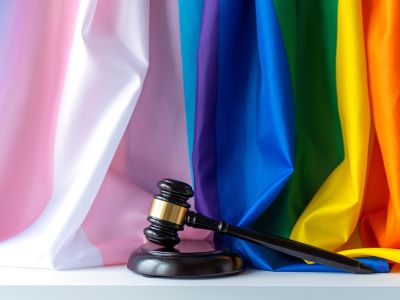On August 16, the Supreme Court refused to lift lower court orders blocking the Department of Education’s (DOE) new regulations protecting LGBTQ+ students from discrimination based on gender identity. The new rule expanded the definition of sex-based discrimination under Title IX to protect gender identity and sexual orientation discrimination in federally funded schools. The entire court agreed three provisions should remain paused—the expanded definition of “sex discrimination,” the prohibition on preventing individuals from accessing bathrooms or other “sex-separated spaces” consistent with their gender identity, and the definition of “hostile environment harassment,” but the Court majority refused to allow the remaining regulations to go into effect.
The U.S. 5th and 6th Circuit Courts of Appeals had upheld lower court decisions blocking the DOE from enforcing the new rules. The Court doesn’t clarify what impact its decision may have on its Bostock ruling under Title VII of the Civil Rights Act of 1964.
9th Circuit Holds Online Harassment Actionable
A unanimous 9th Circuit panel held in Okonowsky v. Garland that a federal prison guard’s Instagram posts denigrating a female coworker can qualify as unlawful harassment. Although Steven Hellman made hundreds of posts denigrating women—including jokes about raping his coworker Lindsay Okonowsky—the district court found his online activity didn’t match up with what was needed for a Title VII harassment claim because the posts “occurred entirely outside the workplace,” weren’t sent to her directly, and weren’t shown to her while on the job.
The 9th Circuit panel disagreed, rejecting the notion that “only conduct that occurs in the physical workplace can be actionable,” particularly because of “the ubiquity of social media and the ready use of it to harass and bully both inside and outside the physical workplace.”
2nd Circuit Says Harassment Continued After EFAA Banned Arbitration
The 2nd Circuit held in Olivieri v. Stifel, Nichols & Co. that an employee harassed after the effective date of the Ending Forced Arbitration of Sexual Assault and Sexual Harassment Act of 2021 (EFAA) can continue with her lawsuit against her employer. Her employer had attempted to reverse the lower court decision and force the case into mandatory arbitration. The appeals court said that although the alleged misconduct began before the EFAA’s effective date, there was a continuing course of conduct that persisted after the EFAA was enacted. According to the court, “Her claim thus accrued after the effective date, the EFAA applies in this case, and she was permitted to invalidate her arbitration agreement.”
Judge Rejects Settlement in NCAA NIL Litigation
U.S. District Court Judge Claudia Wilken refused to preliminarily approve the $2.78 billion deal to resolve the NCAA name, image, and likeness (NIL) antitrust lawsuit. There are two proposed deals before Judge Wilken, and she refused to approve either one. She was especially concerned that one deal would bar college students from entering private NIL agreements with “boosters,” which might affect athletes who currently have such deals.
One of the other objections is the fact that neither settlement compensates women athletes sufficiently. The parties agreed to go back to the negotiating table and give the judge an update by September 26. The continuing issue is the NCAA’s determination to include limits and controls on NIL disbursement while labor and antitrust law require a radical reconstruction of how the NCAA operates and how it relates to its athletes.
Written by the editors of the Federal Employment Law Insider.

